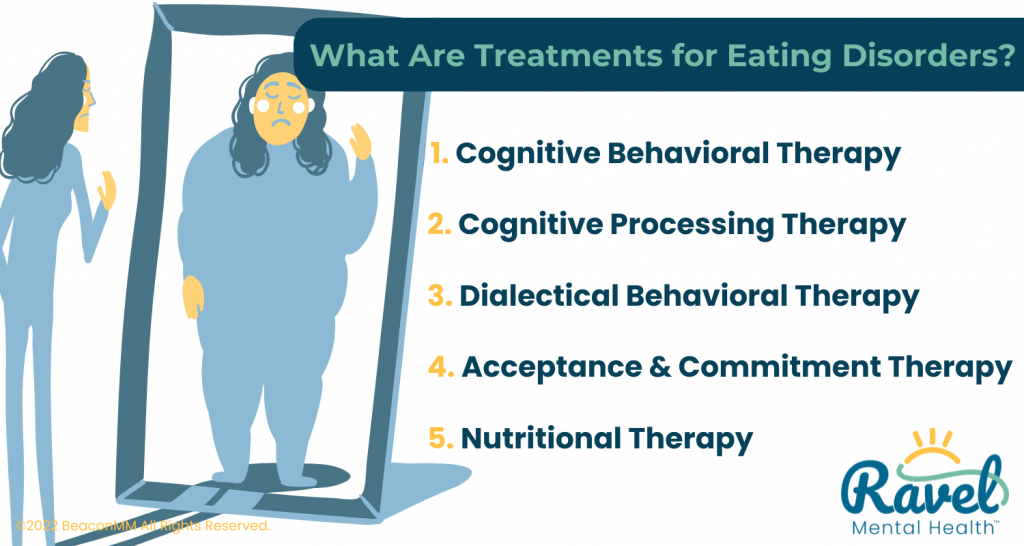Eating disorders can be difficult to live with, and it looks different for everybody. Some people binge eat, making it hard for them to eat regular amounts of food and feel unable to stop eating. On the other hand, someone may not be eating enough food, making it difficult for their body to function at its highest capacity.
Having an eating disorder can be difficult for the body and the mind. So, what can you do to help treat it? Here’s a guide on receiving therapy for eating disorders and five treatment types that can help.
Are you interested in finding a therapist to help you with an eating disorder? Sign up for Ravel Mental Health today to find a therapist near you!
What Are the Types of Eating Disorders?
Eating disorders are behavioral conditions characterized by severe and persistent disturbance in eating behaviors and associated distressing emotions and thoughts. These serious conditions can affect physical, psychological, and social function. An eating disorder can lead to severe health problems, affecting your quality of life.
About 5% of the population have eating disorders, many of which develop during adolescence and young adulthood. Women are more likely to suffer from eating disorders such as anorexia nervosa and bulimia nervosa, but eating disorders can happen to anyone, regardless of gender or age.
Eating disorders can occur through other psychiatric disorders, such as mood and anxiety disorders, obsessive-compulsive disorders, and alcohol and drug abuse. There are many factors that can influence why someone develops an eating disorder, such as their body image, stress levels, relationships, or perfectionist tendencies.
Some types of eating disorders that people may experience can include:
- Anorexia Nervosa: This is characterized by self-starvation and weight loss resulting in someone having a low weight for their height and age. Often, someone with this disorder will consistently have a low nutritional diet, which can lead to severe health problems.
- Bulimia Nervosa: People with this disorder often alternate between overeating and then either fasting, using laxatives, or vomiting to expel the food. This condition can cause long-term damage to the digestive system, especially when the person purges or vomits up food consistently.
- Binge Eating Disorder: This eating disorder is characterized by someone eating very large amounts of food in one meal. The person often feels out of control of their eating and does not throw up or attempt to rid their body of the food, which can lead to obesity over time.
These are the most common types of eating disorders that people may have. Eating disorders are very serious as they can be potentially fatal and can impair family, social, or work functions.
There are other less common eating disorders that also warrant a visit to a medical professional. The following types include complex categories of eating disorders:
- Avoidant Restrictive Food Intake Disorder: Involves a disturbance in eating resulting in persistent failure to meet nutritional needs and are extremely picky eaters.
- Pica: Involves repeatedly eating things that are not food with no nutritional value. This can include eating paper, chips, soap, cloth, hair, etc.
- Rumination Disorder: Involves repeated regurgitation and re-chewing of food after eating where swallowed food with being voluntarily re-chewed, re-swallowed, or spat out.
Each type of eating disorder can have different levels of severity and affect everyone differently. It’s important to see a healthcare professional if you or someone you know suffers from an eating disorder. This condition can often lead to other health problems affecting their physical and mental health.
Are you interested in getting help with your eating disorder? Sign up for Ravel Mental Health today to match with a therapist in your area!
What Are Treatments for Eating Disorders?

Finding treatments for eating disorders can be different for everyone. Since people’s conditions may be more serious or mild, that can change what kind of treatment will be most effective.
So, you may wonder what treatment will work best for you? Therapy can be a great way to help with eating disorders. Here are five treatments that may be effective in helping you recover from an eating disorder.
1. Cognitive Behavioral Therapy
Cognitive Behavioral Therapy (CBT) can be one of the most effective treatments for eating disorder recovery as it successfully treats several different conditions. This type of talk therapy can often help people quickly identify and learn to cope with the challenges of their life. CBT is often combined with other therapies and medications, but this type of therapy for eating disorders can typically aid someone who needs help changing their eating behaviors.
2. Cognitive Processing Therapy
Cognitive Processing Therapy (CPT) is a type of therapy that focuses on traumatic events in a person’s life and how they process their experiences. Some people with eating disorders can turn to food to help them cope with their experiences and emotions. CPT can be a way to help curb impulsive behavior, disassociation, and cognitive disturbances.
3. Dialectical Behavioral Therapy
This therapy is a modified form of CBT that emphasizes psychological and social factors. This focuses on how people’s emotions are aroused much quicker than others and how their reactions may be stronger. Dialectical Behavioral Therapy (DBT) can be a therapy for eating disorders that target mindfulness, interpersonal effectiveness, distress tolerance, and emotion regulation.
4. Acceptance and Commitment Therapy
Acceptance and Commitment Therapy (ACT) stems from CPT and other traditional types of therapy with an emphasis on helping the individual to stop denying and avoiding their inner emotions. They can learn to accept that their feelings are, in some instances, the appropriate response and how to deal with them. People in ACT can work towards acceptance, presence, self as context, values, and committed actions.
5. Nutritional Therapy
One of the best kinds of therapy that someone with an eating disorder can do is Nutritional Therapy. This is often in conjunction with other types of psychotherapy and will target learning about how healthy diets can affect their mind and body. People doing Nutritional Therapy will also learn to understand their hunger and fullness in ways that will enable them to develop successful eating habits.
How to Find Therapists for Eating Disorders
So, you may be ready to start trying therapy to address your eating disorder before you run into challenging health problems. Finding therapists that match your needs or what you’re looking for can be difficult. So, there are new ways to skip past therapist mismatches and get the right treatment.
Ravel Mental Health is an online platform that is revolutionized online bookings within the mental health industry. You can go onto our platform and use our built-in filters to help find the type of therapists you want. Then you can easily book appointments with them and avoid playing phone tag to book an appointment.
If you or a loved one is suffering from an eating disorder, you can utilize platforms like Ravel Mental Health to find therapists to help you find the root of your problem. From there, you can work through treatments that will help you reach a level of healthy eating habits that support your body and mental health. Please don’t wait till it becomes a problem that has led to health problems. You can find the right person in your area to help you achieve the best version of yourself.
Are you ready to start the path to eating disorder recovery? Sign up for Ravel Mental Health today to get started!
